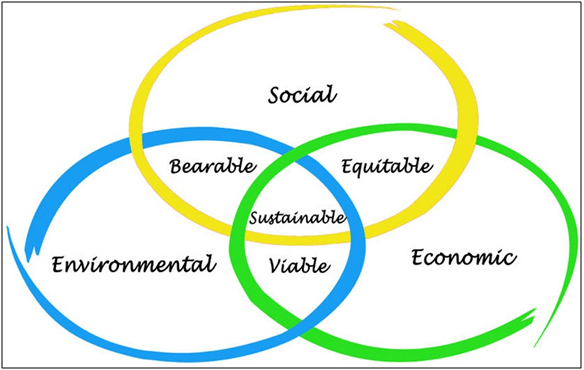The key drivers of sustainable procurement were found to be, social and environmental factors into thought along with financial factors in making procurement decision. The three proportions of sustainability: environmental superiority; social impartiality; and economic success.
Sustainable procurement is generally represented by commitments to environmental sustainability, which emphasizes the utilization of sustainable products and reducing use of resources. Social sustainability tries to reflect local diversity within the workforce by encouraging use of local suppliers and native labour. The organizations meet their needs for goods, services, works and conveniences during a way that achieves value for money on a whole-life foundation as well as Benefits are generated for the organization, society and economy, at the same time minimizing damage to the environment.

Table of Contents
Customer Satisfaction
The concept of customer service or customer satisfaction should be an important aspect of their business for any organization. Public organizations occur to offer services to the public and therefore, they should be able to please all their stakeholders for them to be sustainable. That services accessible to customer, or their social dimension has four important characteristics, time of performance, dependability of service or product, communication to satisfy customer expectation and flexibility or ability to react to customer changing needs. These four components are keys for social sustainability.

Protect Human Health and Safety
Drivers of social sustainable procurement need to do with adding social value to the procurement process.These drivers target at encouraging diversity within the purchasing team or function of public organization and among suppliers who are engaged by the organization to supply it with inputs or offer services monitoring supplier practices to make sure observance of human rights and labor standards and incorporation of health and safety standards in design and specification of products or services and fair and ethical trading practices during procurement processes. Social drivers’ aids in managing and monitoring supply chains to make sure that fair contract prices and terms are applied which ethical, human rights and employment standards are adhered to. Public organizations should strive to take care of a secure and healthy internal environment for its workforce. This falls under the field of social sustainability. The organization human resource or human capital is one among the foremost valuable assets that any organization would boast to possess. It must therefore be treated with care and respect in order that the organization can still be profitably. Without a healthy and motivated staff, the organization will find it harder to stay afloat.

Human Rights and Fair Work Practices
In a business issue, human rights are more and more being seen. They are inextricably connected to corporate risk and reputation management. Through constantly expanding supplier sourcing strategies, more than that by increasing sourcing from developing countries, procurement officers are progressively uncovered to companies functioning in countries with repressive governments, national conflict, and feeble rule of law or poor labour standards. The procurement function must consist of processes that are designed to classify companies that flaunt their responsibility to uphold universal human rights towards their employees and toward the communities during which they operate.

With globalization and raising spreading global supply chains, procurement officers have the unique opportunity likewise responsibility to make certain that the procurement function works for to protect workers’ rights. Companies functioning in global markets are progressively more expected to accept some level of responsibility for labour practices onward their supply chains. This responsibility can and will also form a very important component of the procurement function, by ensuring that contracted companies operate in the interior the universally accepted International Labour Organization’s main agreements on labour standards. Procurement officers should remember a possible supplier’s performance within the subsequent areas:
- Freedom of association and the correct to united negotiating
- Child labour
- Non-discrimination
- Bonded or forced labour
- Achieving decent working conditions.
Strategic procurement can run a framework to make sure that local enterprise becomes an essential component of the procurement policies and practices. Procurement can be frequently adapted to realize good practice within the goals of an organization in terms of gender and the empowerment of women, as well as poverty eradication and good governance.
Good Governance
The procurement function acting an crucial role in achieving and ensuring good governance. It is an important part of a government’s capability to provide the required goods and facilities. A well operating procurement system makes sure; better value for money, better productivity and most operative of delivery, cut down the potential for corruption, positive outcome on a country’s investment climate, non-discriminatory practices, transparency and accountability.
The full content is only visible to SIPMM members
Already a member? Please Login to continue reading.
References
Kariuki & Kwasira. (2014). “Analysis of the Key Drivers of Sustainable Procurement in Public Organizations in Kenya”. Retrieved from https://www.ijsr.net/archive/v3i10/T0NUMTQ2MQ%3D%3D.pdf, accessed 15 June 2020.
Khoo Chai Luan, DPSM. (2018). “Overcoming Key Challenges of Sustainable Procurement Practices”. Retrieved from SIPMM: https://publication.sipmm.edu.sg/overcoming-key-challenges-sustainable-procurement-practices/, accessed 15 June 2020.
Paisley Ang, DPSM. (2019). “Key Considerations for Sustainable Procurement”. Retrieved from SIPMM: https://publication.sipmm.edu.sg/key-considerations-sustainable-procurement-2/, accessed 15 June 2020.
UN Procurement Practitioner’s Handbook. (2012). “Sustainable Procurement Process”. Retrieved from https://www.ungm.org/Areas/Public/pph/ch04s05.html, accessed 25 June 2020.

